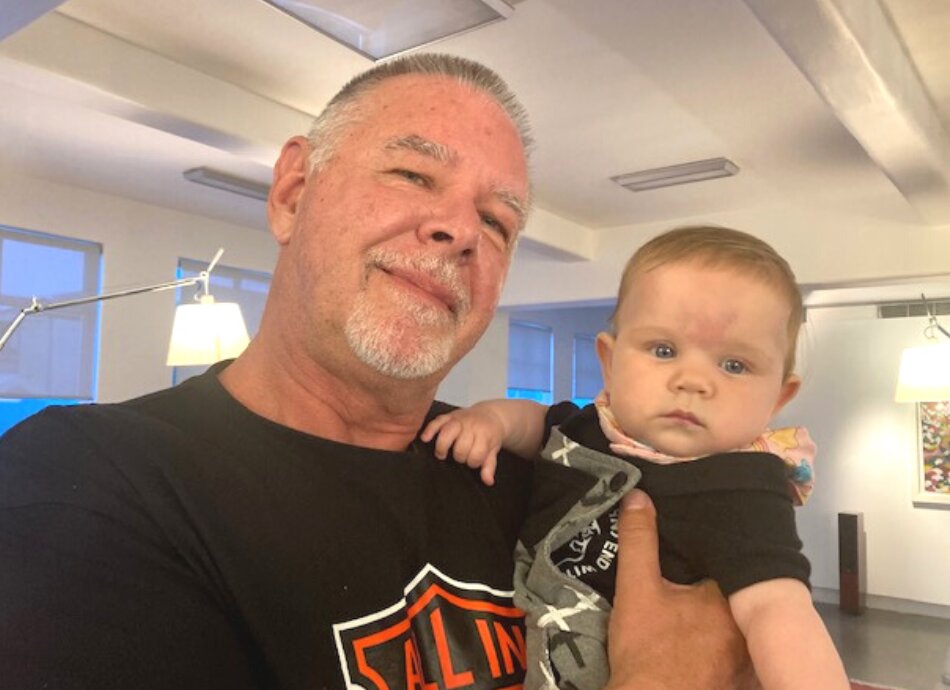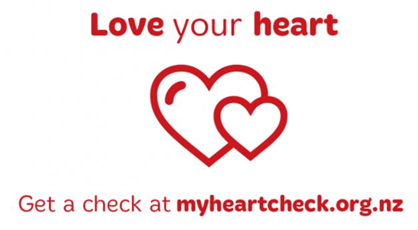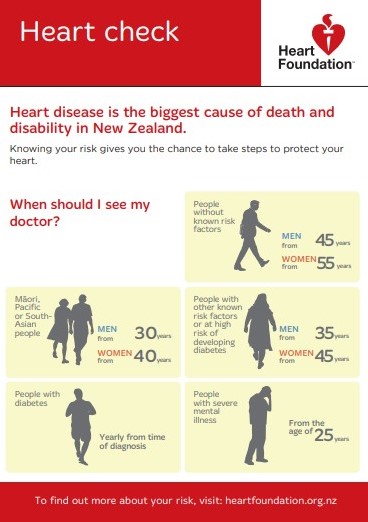If you're a frequent visitor to Healthify, why not share our site with a friend? Don't forget you can also browse Healthify without using your phone data.
Heart risk assessment
Also called cardiovascular risk assessment, or a heart check
Key points about heart risk assessment
- A heart risk assessment is an estimate of how likely you are to have a heart attack or stroke in the next 5 years.
- The age you should start having heart checks depends on your sex, ethnicity and other risk factors.
- You can use an online tool called My Heart Check to give you an idea of your heart health.
- You can also do a heart risk assessment with your GP or nurse. This is the best option if you have had a heart attack, stroke or other heart condition.
- You can improve your heart health by stopping smoking, exercising regularly, healthy eating and drinking, managing stress and taking medicines if you need to.

A heart risk assessment is an estimate of how likely you are to have a heart attack or stroke in the next 5 years. You will get a percentage score such as 10%. This means that out of 100 people with the same risk factors as you, 10 of them will have a heart attack or stroke in the next 5 years.
The score is calculated by building a risk profile based on a series of factors including:
- age
- gender
- ethnicity
- cholesterol levels
- smoking history
- blood pressure
- family history of an early heart attack or stroke and other conditions
- medical history – past or current heart problems, atrial fibrillation (AF), diabetes, kidney disease or stroke.
Some of these factors you can't change, but there are many that you can. That means the choices you make every day do matter. Over time, what you eat, drink, do and how you live increases or decreases your risk of heart disease and stroke.
The age when you are advised to start having heart checks depends on your sex, ethnicity and other risk factors.
| Risk factors | Men | Women |
|---|---|---|
|
If you have no known risk factors |
45 years | 55 years |
|
If you are Māori, Pacific Peoples or South Asian1 |
30 years | 40 years |
|
If you have the following risk factors:
|
35 years | 45 years |
|
If you have diabetes (type 1 or 2) |
As part of your yearly diabetes review | |
|
If you have schizophrenia, major depressive disorder, bipolar disorder or other severe mental illness |
25 years | |
|
||
My Heart Check tool
While the best option is to have a heart risk assessment with your healthcare provider, you can use an online tool called My Heart Check to give you an idea of your heart health. My Heart Check(external link) is a free online heart health check developed by the Heart Foundation. It's designed for Kiwis as it's based on New Zealand data.
It can estimate your heart age compared to your actual age, as well as giving you an estimate of your risk of having a heart attack or stroke in the next 5 years.
This free online tool works best for people aged 30–75. You can still use it if you are older or younger, but your result may be less accurate. 
Use My Heart Check(external link) to:
- get an idea of your heart health
- get tips for how to improve your heart health
- talk about your heart health with a healthcare professional.
You will need to provide information such as:
- your age
- your height and weight
- your cholesterol levels (lipid profile)
- your blood pressure
- your medical history.
If you're not sure about some of this information, you can leave it out, as the tool can base your results on an estimate.
Note that this tool is not recommended if you have had a heart attack or stroke or have another heart condition.
GP or nurse
The best (most accurate) option is to have a heart risk assessment with your healthcare provider. They can calculate your heart risk based on your age, medical history and all the other risk factors. They can also advise how often you need a heart risk assessment based on your situation.
Seeing your GP or nurse is also the best way to find out your heart health if you have had a heart attack, stroke or other heart conditions, as they know how to manage your condition.
See your healthcare provider. Based on your risk score, they will advise what you need to do, such as make lifestyle changes or start taking medicines for blood pressure, cholesterol or diabetes. Your healthcare provider will also let you know how often you would need to have a heart risk assessment based on your risk score to maintain your heart health.
Knowing your risk can help motivate you to make some positive lifestyle changes. You have an important role to play in your heart health. While some risk factors can't be changed, others can. The choices you make every day do matter. Over time, what you eat, drink, do and how you live can improve your blood pressure and your cholesterol level. It can also improve the health of your arteries (atherosclerosis) and decrease your risk of heart disease and stroke.
Even a small change can have a positive impact on your risk of heart attack and stroke. The more healthy changes you make, the better it is for your heart health.
- If you smoke, stop smoking
- Move more
- Reach a healthy weight
- Manage stress
- Take medicines prescribed
- Reduce alcohol intake
- Complementary and alternative medicines*
*Please talk to your doctor before exploring this option. Herbal or natural products and dietary supplements are not always safe and some treatments (taken by mouth) can create interactions with prescribed medicines. Discuss with your doctor any benefits of using complementary and alternative medicines (CAM) and check interactions with your conventional medicine or treatment and any safety concerns.
Apps reviewed by Healthify
You may find it useful to look at some Quit smoking apps, Alcohol use apps, Blood pressure apps, Self-management apps and Nutrition, exercise and weight management apps.
Heart disease | Mate manawa
Heart disease tests
Angina
Heart attack | Hē manawa
Heart attack and cardiac arrest
Heart failure | Manawa ngoikore
Stroke | Mate rehu ohotata
Cholesterol - high| Mate toto hinuhinu
Heart risk factors – physical activity
Heart valve disease | Mate manawa takirere
Heart disease – cardiac rehabilitation
Your heart(external link) Heart Foundation, NZ
My Heart Check(external link) Heart Foundation, NZ
Absolute CVD risk benefit calculator(external link)
Brochures
Lowering your risk of heart attack and stroke(external link) Heart Foundation, NZ, 2019
Heart check(external link) Heart Foundation, NZ
Eating for a healthy heart(external link) Heart Foundation, NZ, 2023
Heart attack – warning signs poster(external link) Heart Foundation, NZ
CVD consensus statement update(external link) Heart Foundation, NZ, 2018
Apps/tools
Aspirin bleeding risk calculator
Quit smoking apps
Alcohol use apps
Blood pressure apps
Self-management apps
Nutrition, exercise and weight management apps
References
- Cardiovascular disease risk assessment and management for primary care(external link) Health New Zealand | Te Whatu Ora
- What’s new in cardiovascular disease risk assessment and management for primary care clinicians(external link) BPAC, NZ, 2018
Brochures

Heart Foundation, NZ

Heart Foundation, NZ, 2023

Heart Foundation, NZ, 2019
Credits: Healthify editorial team. Healthify is brought to you by Health Navigator Charitable Trust.
Reviewed by: Associate Professor Sue Wells, Public Health Physician, University of Auckland
Last reviewed:
Page last updated:





